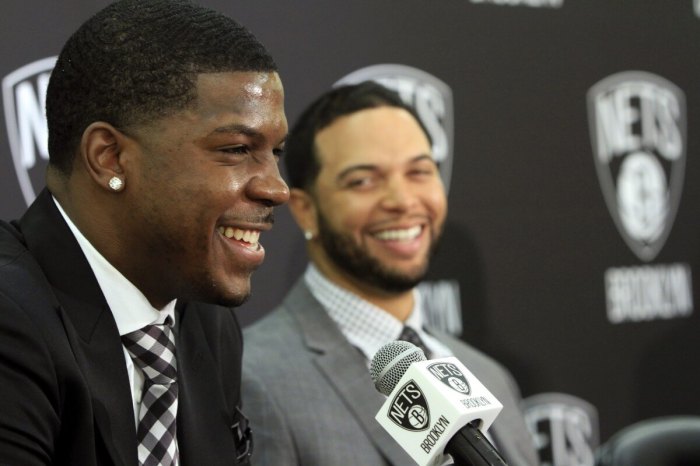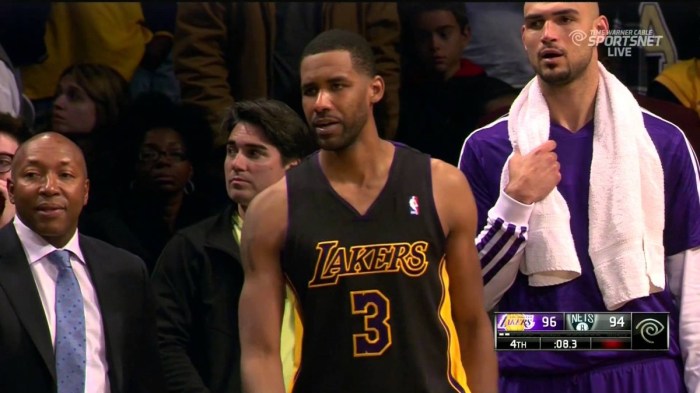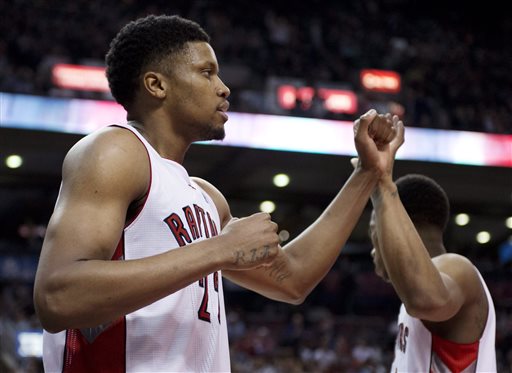On the heels of stalled trade talks for Dwight Howard, Brook Lopez, the Nets’ longest-tenured, most-maligned player, agreed to sign a four-year maximum contract with the Brooklyn Nets worth slightly more than $60 million over four years. The deal, presumably constructed with the standard 7.5% raises, will start at roughly $13.6 million in 2012-13 and will increase steadily until 2015-16, when Lopez is due somewhere in the vicinity of $16.9 million.
Pundits and fans alike have scoffed at the idea that Brook Lopez, who treats missed shots like allergens and can’t even defend his own reputation, could earn a “maximum” contract in today’s run-and-gun athlete NBA. But there are a few factors at play here; the first being the term “maximum,” which implies a Joe Johnsonesque contract that cripples a team’s ongoing flexibility. $60 million over four years is a lot of money, but it’s not the true “max” by NBA standards, merely the maximum Lopez was eligible to make this time around. Had the maximum for Lopez’s services been in the $100 million range, $60 million would still seem like an overpay to many, but not nearly to the extent it’s been decried.
Secondly, despite paying an average of $15 million for Brook Lopez in the next four seasons, his seemingly albatross contract has little effect on the Nets’ overall cap situation. The Nets will be strapped for cap room in the next four seasons even without Lopez — depending on minor factors surrounding Gerald Wallace’s deal and the presumed deal for Reggie Evans, the Nets have roughly $53 million committed to eight players not named Lopez in 2012-13, $55 million to six players in 2013-14, $60 million to six players in 2014-15, and $57 million to Deron Williams, Joe Johnson, and Wallace in 2015-16. Lopez’s contract will affect the luxury tax — a tax the Nets will assuredly pay in each of the next four seasons — and hinder Nets’ ability to use the mid-level exception beyond this year’s commitment to Mirza Teletovic. But for all intents and purposes, the Nets could have given Lopez any amount of money within his market, and it wouldn’t have made much difference to their long-term flexibility.
Thirdly, and most crucial, the Nets were never going to let Brook Lopez go, if only because any other option would be a disaster. Had they let him go, they’d have no center and no cap room to sign one. They had his bird rights and the ability to match any offer, including reported max offer sheets from Charlotte and Portland. The cap number’s irrelevance is just a bonus.
Signing Brook Lopez to a contract not bound to a sign-and-trade also yet again removes the Nets from the Dwight Howard sweepstakes. As Lopez was signed under the “Early Bird” provision in the CBA, the Nets are unable to make a trade involving Lopez for Howard until January 15th, by which time I think everyone expects Howard long gone. The Nets are also unable to sign Howard outright in free agency, as I’ve detailed numerous times. So if the dream was dead two days ago, consider this signing a dream knife attached to a dream power drill joining the dream chainsaw.
 The benefits to signing Lopez are obvious; the Nets have done something they haven’t done since the Jason Kidd era: locked into a core for the long-term. Williams, Johnson, Wallace, and Lopez make up the Nets’ iteration of a “Big 4,” and all four are signed through the 2015-16 season (Williams one additional year, with a buyout clause). Barring injury, committing to this core cements the Nets will at least enter Brooklyn a winner, which matters above all else to the franchise. Gone are the days of ripping cloth apart and hoping someone would come along with silk. This core won’t compete for championships, barring injuries to Miami and Oklahoma City, but they’ve got as much claim to second-best as anyone in a highly volatile East.
The benefits to signing Lopez are obvious; the Nets have done something they haven’t done since the Jason Kidd era: locked into a core for the long-term. Williams, Johnson, Wallace, and Lopez make up the Nets’ iteration of a “Big 4,” and all four are signed through the 2015-16 season (Williams one additional year, with a buyout clause). Barring injury, committing to this core cements the Nets will at least enter Brooklyn a winner, which matters above all else to the franchise. Gone are the days of ripping cloth apart and hoping someone would come along with silk. This core won’t compete for championships, barring injuries to Miami and Oklahoma City, but they’ve got as much claim to second-best as anyone in a highly volatile East.
Salary cap aside, the Nets have a plethora of different looks available to them on the floor, with three starters capable of playing multiple positions and scoring all over the floor and one of the most talented scoring centers in the NBA. Detractors point to Lopez’s downwardly spiraling rebounding numbers, but the Nets have posted roughly the same rebound percentage each year whether Lopez is on the floor or not. Some may say that speaks to his faults, I say it speaks to his mediocrity.
Defense is a bigger issue — the Nets have been consistently worse defensively with him on the floor, but Lopez’s best season defensively — his rookie campaign — came when flanked with two legitimate offensive options (Vince Carter & Devin Harris) on the wing. It’s not a reach to at least imagine Lopez could improve when allowed to focus more on the defensive side of the floor. They will never be a great defensive team, and Lopez will never be a great defensive player, but they’ve got the potential to finish in the top half of the league defensively.
Of course, the lock-in also comes with a bigger, long-term questions. The Nets are often compared to the Atlanta Hawks these days, for obvious reasons, but I see more parallels to the Boston Celtics. Championship aspirations aside, the Nets in four years will face the same issue Boston’s facing now: do you blow up an aging core, or hold on to that dream for a few more years?
In the interim, he next steps for Brooklyn are much smaller ones; most notably, a backup point guard to ease the depth chart between Williams and rookie Tyshawn Taylor, a backup center to spell Brook Lopez, and their two remaining key free agents: power forward Kris Humphries and swing man Gerald Green.
Roster fill-outs and down-the-road questions aside, the Nets put themselves in the position to win immediately upon entering the Barclays Center two years ago when they made the Deron Williams trade. Without Dwight Howard — an unlikely proposition already — signing Brook Lopez was merely a formality on that road.
Statistical support for this story was provided by NBA.com.



















